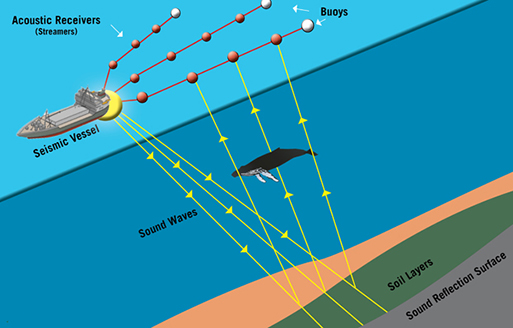By TIM FAULKNER/ecoRI
News staff


Seismic surveys involve
powerful airguns blasting at 10-second intervals and measuring the echoes off
the seafloor to help map offshore oil and natural-gas fields. (Center for
Biological Diversity)
The Trump administration has
temporally halted plans to open most of the nation’s coast, including the
Atlantic continental shelf, to offshore drilling, but seismic airgun blasting
may still happen.
According to the Bureau of Ocean Energy Management (BOEM), permitting for seismic surveys in the Atlantic Ocean continues to move forward.
Seismic surveys involve the use of
undersea airguns to search for fossil-fuel deposits buried deep beneath the
seafloor.
The blasts can occur for days and weeks, using multiple cannons that can be heard for thousands of miles. The sound damages and disorients sea life such as whales, dolphins, and sea turtles and destroys food sources like fish eggs and larvae.
The blasts can occur for days and weeks, using multiple cannons that can be heard for thousands of miles. The sound damages and disorients sea life such as whales, dolphins, and sea turtles and destroys food sources like fish eggs and larvae.
The National Marine Fisheries
Service has issued incidental harassment
authorizations (IHAs) to five companies, which allow them to harm
sea life while conducting surveys between Delaware and Florida. The companies
await final permits from BOEM.
According to a business group representing the five companies — ION GeoVentures, based in Houston; Spectrum Geo Inc. of England; TGS-NOPEC Geophysical Company of Norway; WesternGeco of England, a division of Schlumberger; and CGG, based in Paris — they all intend to continue seeking the permits.
According to Oceana, seismic airgun
surveys in the Atlantic Ocean could injure 138,000 whales, including the
endangered North Atlantic right whale.
The recent admission by the Trump
administration wasn’t an official statement, but remarks by Interior Secretary
David Bernhardt in an April 25 Wall Street Journal interview indicated that the
White House’s offshore drilling plan was on hold pending a court appeal.
On Jan. 6, 2017, near the end of his
second term in office, President Obama imposed bans on seismic surveys off the
mid- and south Atlantic. Trump overturned the bans in April 2017, adding the
entire Atlantic and Pacific coasts, or about 90 percent of the U.S. shoreline,
to his five-year offshore drilling plan.
A court ruling in March stated that
Trump exceeded his authority by signing the executive order. The U.S. District
Court for the District of Alaska said presidents can only impose drilling bans,
while Congress has the authority to overturn such bans.
An appeal may take years and could
reach the Supreme Court, prompting the Department of Interior (DOI) to posture
that it is pausing the initiative.
Several East Coast states, including
Massachusetts and Connecticut but not Rhode Island, have joined a lawsuit suing
the National Marine Fisheries Service, a division of the National Oceanic and
Atmospheric Administration, for not protecting marine natural resources.
Dozens of municipalities, business
organizations, and environmental groups such as the Southern Environmental Law Center have filed
lawsuits, claiming that offshore fossil-fuel extraction would harm the
ecosystem and tourism.
The latest legal action takes place
as the DOI’s Office of Inspector General conducts investigations into potential
ethics violations by six senior officials at DOI, including Bernhardt.
“This certainly isn’t over. I won’t
stop fighting the Trump administration’s offshore drilling proposal until every
part of it — including seismic testing — is fully abandoned,” Sen. Sheldon
Whitehouse, D-R.I., said.